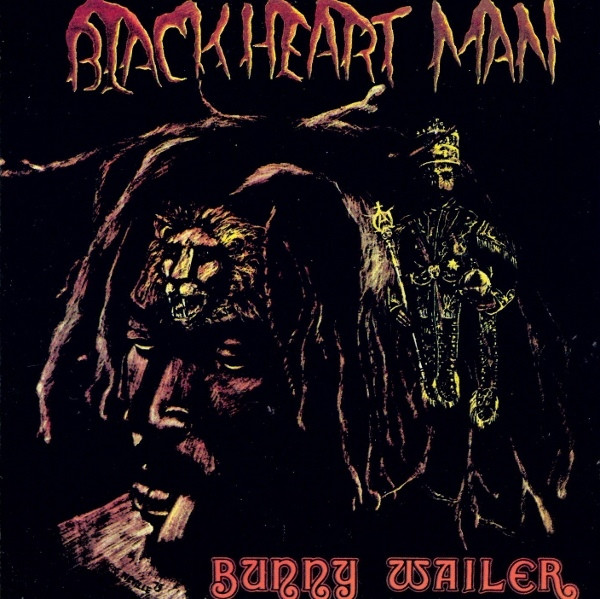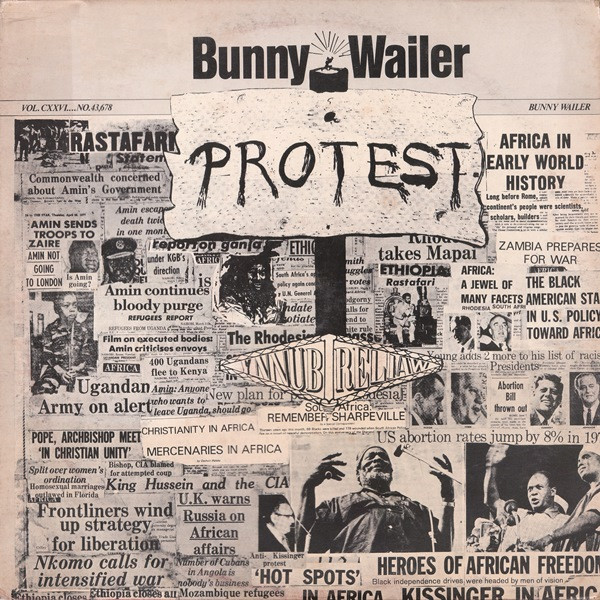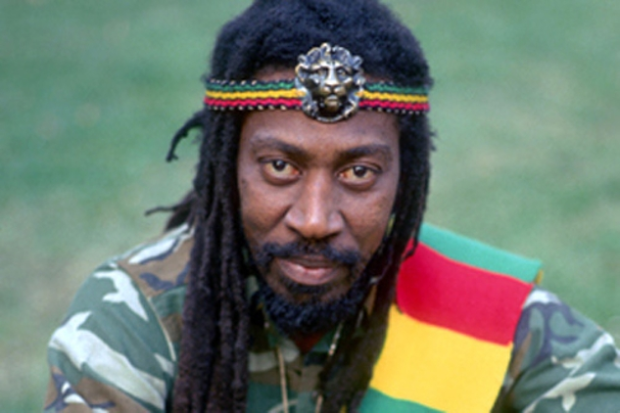Bunny Wailer—One of the Three Most Important Third World Musicians (as chosen by Newsweek magazine)
A critical look at his early solo career 1976-1983. Part 1 of 2.
Bunny Wailer (1947-2021) was born Neville O'Riley Livingston in Kingston, Jamaica. At age eight he moved to the village of Nine Mile in Saint Ann Parish where he met Bob Marley. The two boys were raised by single parents and when Bunny's father, "Toddy" Livingston fell in love with Bob's mother, Cedella, the two adults moved back to Kingston, with Bunny and Bob being raised together.
The Wailers
In the early 1960's Bob and Bunny were practicing songs together when they met the legendary singer Joe Higgs, a man who was to exert an enormous influence on the Wailers. Higgs taught them how to perfect harmony singing and hooked them up with another teenager, Peter Tosh. With countless months of harmonizing under their belts, they eventually got an audition with Clement " Coxsone" Dodd. and the first song they cut, "Simmer Down" in 1964, a ska scorcher, immediately rose to the top of the Jamaican charts. The Wailers' legend had begun. On their earliest recording sessions they were joined by Junior Braithwaite, Beverly Kelso and Cherry Green. Braithwaite sang lead on a few songs in his eight month stay with the group, but the vast majority of the public knows the Wailers as Bob, Bunny and Peter and this trio's outstanding achievements brought reggae to the attention of the whole world. Reggae was a huge seller in England, France, Germany, Spain, Japan, and all over Africa starting in the early 1970's. Facing fierce competition by rock, disco, country, funk, rap, hip-hop and metal here in the States, reggae still sold respectably, due mostly to Marley, but it didn't dominate like it did in other parts pf the world.
As I mentioned in a previous article-
"A strong case can be made for Bob Marley being the most important musical artist of the 20th century. As of September 2022 his album Legend has spent a total of 748 consecutive weeks on the Billboard 200 albums chart, the second longest run in history. As of September 2022, it has spent 1,047 weeks on the U.K. albums charts--the third longest run in the chart's history. After Marley died, Bunny became the most popular and revered singer in reggae and dancehall and the winner of multiple Grammy awards."
Bunny was an integral part of the Wailers, singing and playing percussion. and IMO he had the best voice of the three singers. Bunny sang harmony with Tosh on the plethora of songs the original Wailers recorded, singing lead on only about 10 songs, mostly when Bob left Jamaica to come to Delaware, U.S.A. to earn money so the Wailers could start their own label back in Jamaica. Before we delve into Bunny's solo career, let's hear two songs with him singing lead with the Wailers
"Dancing Shoes"
(A lovely late ska song from 1966 showing a gentle, carefree Bunny)
"Rolling Stone"
(Bunny adds some dagger-like words to this 1966 song right on the cusp of late ska and early rock steady. "Time like scorpion stings without warning."
We mischievous reggae boys here in New York City used to joke that Dylan was in Jamaica and heard the Wailers singing this. Recognizing its greatness, he immediately flew back to New York and cut his own version)
If Bob was the visionary and spokesman of the Wailers and Peter was the militant revolutionary, then Bunny was the spiritual side of the triangle. But if the situation called for it, he could be just as aggressive as Peter. Many times during the Wailers' career they were ripped off by producers. One time a disagreement with a producer made Bunny a legend in Jamaican folklore. The group cut an entire album of songs for Leslie Kong, actually the first Jamaican album not composed entirely of singles. Kong told the group he was going to call the album The Best Of The Wailers. Bunny was furious, telling Kong that since they were all young men with many years of recording sessions ahead of them, it was impossible to knowingly call this "the best of." Bunny added that if indeed Kong thought this was their crowning achievement, that meant that Kong would die soon. Kong laughed at Bunny. Shortly after the album's release, Kong dropped dead. Bunny later recalled "Because he saw the last of the Wailers so to him really was the best of the Wailers, for it ended for him. He heard the best.".
After that incident I don't think anyone crossed Mr. Livingston.
From the Wailers initial 7" single release in 1964 to the Burnin' album in 1973, Bunny was content to mainly take a backseat to Bob and Pete, mainly singing harmony with his high sweet voice sometimes slipping into falsetto, But constantly being thought of as the third Wailer must have taken its toll on this talented musician. Two events broke the camel's back for Bunny and a concert broadcast by the BBC on may 24, 1973 would be his last recording with the Wailers. Around that time Chris Blackwell, the owner of Island Records, remarked that the Wailers would play "freak clubs" on their upcoming American tour. Bunny, with his deep Rastafarian beliefs, did not like the sound of this. Also, their signing to Island label and their recordings of Catch a Fire and Burnin' albums meant long months of recording and touring in England in 1973.and when Blackwell gave the group a bill for $80,000 at the end of their spring tour, Bunny quit on the spot. He was to spend the next 13 years never leaving Jamaica.
Bunny Wailer's solo career.
Bunny spent the next few years living in a Rasta community in Jamaica, occasionally releasing a 7" single.
It may surprise some that given his bitter feelings toward Blackwell, Bunny chose Blackwell's Island Records for his first solo album, the monumental Blackheart Man. But Bunny had an ace up his sleeve. He inserted an unusual clause into his contract specifying that in the event of Blackwell dying, he would be free of his contract. "That way," Bunny is reported to have said, " I can get out of the contract at any time." Bunny received an extraordinary $42,000 advance to make the album
 Released in 1976 on Island Records
Released in 1976 on Island Records
By anyone's standards, Blackheart Man is a masterpiece, universally regarded as one of the 10 greatest reggae albums of all time. It's obvious that long months were spent on the production. The musicians assembled are all superb, the songs are extraordinary, the arrangements are heavenly and the recording is state of the art. Island initially released it in a lavish gatefold with pictures and all the lyrics.
The opening over six minute song, "Blackheart Man," is extraordinary, recounting the travails of specifically a dreadlock man and indeed all the societal outcasts, the downtrodden, the ones who face discrimination because of their looks and beliefs. It might be hard to think about it now, but when the first Jamaicans embraced the Rasta way of life and grew dreadlocks, they were immediately seen as criminals. As the Trinidadian calypso singer Explainer said in his 1978 song "Dread."
"If someone steals money from the treasury
Is a Rasta first who gets the blame
A German steal two million from this country
First suspect they call a Rasta's name
They can't have peace no time
They always linking them with some crime
If you read the daily papers,
Any crime committed they say a Rasta's name".
Bunny explained it best in a 2015 interview on National Public Radio
Well, the blackheart man is something that is related to our culture, custom and practice," he explains. "There was a kind of nickname that was given to the Rastaman: the blackheart man. Parents used to tell us, 'You be careful where you go. Watch out for the blackheart man.' So we grew up with the blackheart man being that kind of a challenge. Where we are concerned, we still maintain the order of the blackheart man."
As a kid, Bunny was clearly unimpressed by warnings to stay away from Rastas.
"I've been a blackheart man since four years of age," he says. "I used to play in the gullies, and one day we were there playing, and we just saw a foot come out of a manhole — just a foot. And every man, every youth, run from the scene. And when he came out, he had a flour bag shirt. ... He looked at me and said, 'So why you don't run?' I said, 'For what?' And I became a Rastaman from that day. From then on until now, my dreadlocks touch the ground when I stand."
"Blackheart Man"
Every track on Blackheart Man is a standout. The lyrics are power packed, extremely well crafted and dread, yet there is a delicate, poetic sensibility to these songs. One of the most deeply personal for Bunny and his faith is the sublime "Rastaman"
"Rastaman"
The last song we will hear on this magnificent album might be referred to as the elephant in the room. "Dreamland" was originally recorded by the Wailers in 1966 with Bunny singing lead and Peter harmonizing (That was when Bob was in Delaware) It was again recorded, this time with all three Wailers present and Bunny again singing lead in 1971 with Lee Perry producing. So this was the third time Bunny was out front on this song. It was long considered by everyone to be Bunny's vision of a Rasta utopia, with strong back to Africa sentiments and was hailed as one of the masterworks in Bunny's career.
"There's a land that I have heard about
So far across the sea (repeat)
To have you all, my dreamland
Would be like heaven to me (repeat)
We'll get our breakfast from the tree
We'll get our honey from the bees
We'll take a ride on the waterfalls
And all the glories, we'll have them all
And we'll live together on that dreamland
And have so much fun (repeat)
Oh, what a time that will be
Oh yes, we'll wait, wait, wait and see
We'll count the stars up in the sky
And surely we'll never die"
However, it turned out Bunny plagiarized, appropriated, stole (take your pick) the song from an obscure Vee Jay recording in 1964 titled "My Dream Island" by a group from Lakawanna, N.Y. called El Tempos. It was written by the singer and guitarist Al "Bunk" Johnson and is essentially a love song. It also contains the last line "And surely we'll never die." Note that Rastafarians do not believe in death but rather in eternal life. (The El Tempos' single is extremely rare with few copies in existence).
I have yet to find out if there were any legal ramifications or monetary settlements involved in this incident. It seems no one involved has ever talked on record. Be that as it may, this is a gorgeous rendition by Bunny.
"Dreamland"
 Released in 1977 on Island Records
Released in 1977 on Island Records
After the sublime Blackheart Man LP, Bunny's sophomore effort was bound to be something of a letdown, and it is. Protest does not scale the heights of its predecessor but it does contain some excellent songs. The most well known is "Get Up Stand Up" which the Wailers recorded on their Burnin' LP. There, Bob took the first two verses and Peter the third. So on Protest, Bunny finally got to put his own personal stamp on the song. And he does, The song begins with his voice 14 times proclaiming "We want the truth."
Two of the best tracks on Protest are "Moses Children" and "Wanted Children."
"Moses Children"
(Lovely lyrics and arrangements. Bunny uses biblical references to the Exodus and slavery to draw an analogy to his own precarious situation working for the man to earn a decent living. Bunny's way out is through conscious reasoning and mediation.
"Wanted Children"
(A heartfelt, impassioned Rastafarian plea to let the children and all living things on earth be free from killing, slavery and domination of any kind. Wonderful lyrics and the background singing by the Solomonic Enchanters is gorgeous)
Both albums referenced in this article have been repressed many times and are easy to purchase on Discogs or other online sites. Copies can be found in many used record stores with a reggae section. First and early pressings are not expensive.
Blackheart Man
Protest
-----------End, Part 1-----------
Part 2 will cover:
Struggle
Sings The Wailers
In I Father's House
Rock 'N' Groove
Tribute
Hook Line & Sinker
Live!
Roots Radics Rockers Reggae
Rootsman Skanking












































